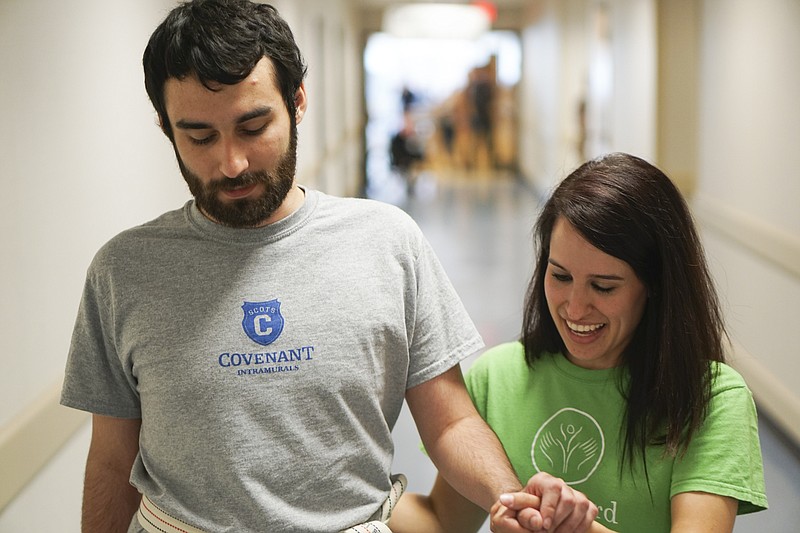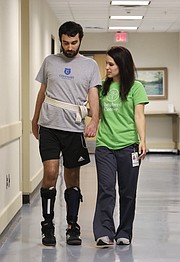With an hour to go until lunch, Joel Elmore sat at a table in the middle of a small, windowless room brightened with a few paintings of tropical birds.
Alternating glances between the wall in front of him and the plastic grip exerciser in his right hand, he focused on moving his limp fingers, willing them to clench.
"How's the resistance feel?" asked his personal trainer, Sara Brockmann. Sitting to Joel's right, she watched his movements carefully, occasionally plucking various hand exercisers out of a small tub on the table for her patient to try.
"It's good," he responded with a nod. But after a dozen repetitions, Joel didn't have the strength to close his right hand anymore - a symptom of the fatigue he'd learned to live with.
On to the left hand.
"This one is coming back the slowest," he said as the exerciser traded hands. Here the resistance proved to be too much and Sara stripped a rubber band off the tool to make it easier. He clenched about eight times and handed it back.
With hand-strengthening done for the morning, Joel pushed back from the table, dropping his hands to the sides of his wheelchair.
He grabbed the wheel rims, pushing himself out of the room and into the hallway, using his feet with their supportive ankle braces to help pull himself along. While heading toward the next exercise room, he stopped for a few seconds when a foot dragged too slowly and was caught under the chair.
After looking down to see what caused the holdup, Joel pulled his foot out to get back on his way, soldiering on while his trainer walked behind.
"My ankles aren't activating yet," he said.
He had been able to make little trips like this by himself for a few weeks, however slow and halting his progress might be. It's not much, but Joel and his family have learned to celebrate things that aren't much. Wiggling toes. Shrugging shoulders. Blinking.
These little victories mean the world because only a few months ago, they seemed as impossible as walking on water.
A few months ago, they didn't know if Joel would even be alive today.
CLIMBING OUT OF A CRATER
Over the span of a few days in March, Joel, 22 and a senior in his last semester of Covenant College, went from playing soccer and rugby to lying in a hospital bed in a near-comatose state, breathing through a tube in his throat.
After ruling everything else out, doctors diagnosed him with Guillain-Barré syndrome, an extraordinarily rare disease that affects only 1 in 100,000 people.
For reasons medical professionals don't entirely understand, the immune system begins to mistakenly attack the body instead of protecting it.
Specifically, GBS targets the nerve system. Antibodies strip away the myelin sheath, a covering that surrounds a portion of the nerve and helps it transmit signals throughout the body.
Symptoms begin with tingling in the fingers and toes as the body is cut off from the brain by the damage done. The ability to move is wiped out as the disorder creeps inward from the extremities into the chest in a manner of days or hours.
The majority of people who are diagnosed with GBS make a full recovery within two years, but the initial onset can be terrifying.
In Joel's case, his immune system also damaged the actual nerve cells underneath, making his case deathly severe. Within 48 hours, he went from perfect health to being hooked up to a respirator.
For days, he was unresponsive, but eventually, he opened his eyes.
Bit by bit his condition improved, and now he's working through an intense outpatient regimen at the Shepherd Center in Atlanta, one of the most renowned rehabilitation centers in the world. He can even walk, with a personal trainer helping to stabilize him.
In one session, Sara had Joel do a series of push-ups and shoulder workouts, meticulously isolating and stressing each muscle group to get it working again.
"We have to remind his brain that his body is here," she said.
Joel is eager to put GBS behind him, working himself to exhaustion. Propping himself up on his elbows, he held a plank position on his toes for a couple dozen seconds before collapsing onto the cushioned pad below him.
"It's been a humbling experience. I've lost all my strength and I just want to be strong again," he said during a break.
"It sucks. You need people gathering around you all the time," he said. "I couldn't open a bottle cap or unbutton my pants."
The loss is clear in Joel's limbs and behind the beard that has grown thicker since he came to the Shepherd Center. In the months after the disease struck, Joel lost 40 pounds while lying in and eating only foods he could swallow easily.
"I'm sick of pudding, mashed potatoes and macaroni and cheese," he laughed.
THE ZIKA CONNECTION
In the months since Joel was diagnosed, GBS has been linked to another mysterious malady - the Zika virus.
On April 7, the World Health Organization published a situation report on the virus after months of study and concluded the two were likely connected. In just a handful of cases worldwide, the virus is thought to have triggered the onset of GBS.
"Based on a growing body of preliminary research," the report read, "there is scientific consensus that Zika virus is a cause of microcephaly and Guillain-Barré syndrome."
As of July 6, the Centers for Disease Control and Prevention has recorded 1,133 instances of the virus in United States, but only five cases of GBS that are thought to be connected.
Tom Skinner, spokesman for the CDC in Atlanta, said cases of GBS associated with Zika are "exceedingly rare," but did say certain demographics are at more risk than others.
"First and foremost when it comes to Zika, our primary focus is on pregnant women," he said.
Hundreds of babies in Central and South America have been born with microcephaly, a birth defect that causes the child to be born with an abnormally small head. Health professionals believe their mothers were bitten by Zika-infected mosquitoes while pregnant.
The situation has become dire enough that the CDC is strongly discouraging pregnant women from traveling to Rio de Janeiro in August for the 2016 Olympics.
But pregnant women aren't the only ones at risk, Skinner said.
"From what we know, GBS increases with age and people older than 50 years seem to be a clear risk for developing GBS," he said.
The Zika virus is rare in the U.S., even more so for Zika-related GBS, and there have been no reported instances of local transmission, but professionals still recommend taking precautions because the maladies are so unknown.
Since treatment is difficult, they recommend using insect repellent and wearing long-sleeves to avoid being bitten in the first place.
"Prevention is the best precaution," Skinner said.
PASSING THE TORCH
As weak as he still is, Joel is making rapid progress and has started giving back to the community that helped him come out the other side.
His mother, Cindy Elmore, said he'll wheel around the floor where newcomers are brought to live while they begin the long journey back to their old lives.
She said, "He goes room to room saying, 'You're going to get off this ventilator. You're going to be able to open your eyes. It's going to come back and it's going to be all right.'"
"You pass the torch on," she said.
That attitude is fitting for a man who had every intention of going to seminary after graduating from Covenant College in May. Thanks to GBS, his degree got put on hold, but after being through this sickness he said he wants to go into counseling.
And he wants to play soccer again.
As he regains control of his limbs and puts on weight, his targets for recovery are getting more and more ambitious. Instead of swallowing solid food, he's pushing himself to climb flights of stairs.
Joel has another year or two of rehab to undergo, but doctors believe he is going to make a full recovery. The only question is how quickly he'll be back on top.
In a week, one of his best friends will be getting married in Chattanooga. He said that's the deadline for one of his biggest goals.
"I want to be able to stand for the whole wedding."
Contact staff writer Emmett Gienapp at egienapp@timesfreepress.com or 423-757-6731.

